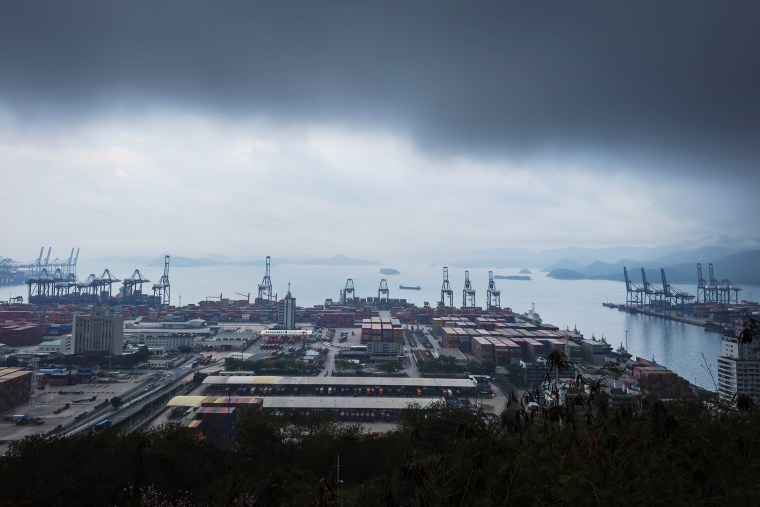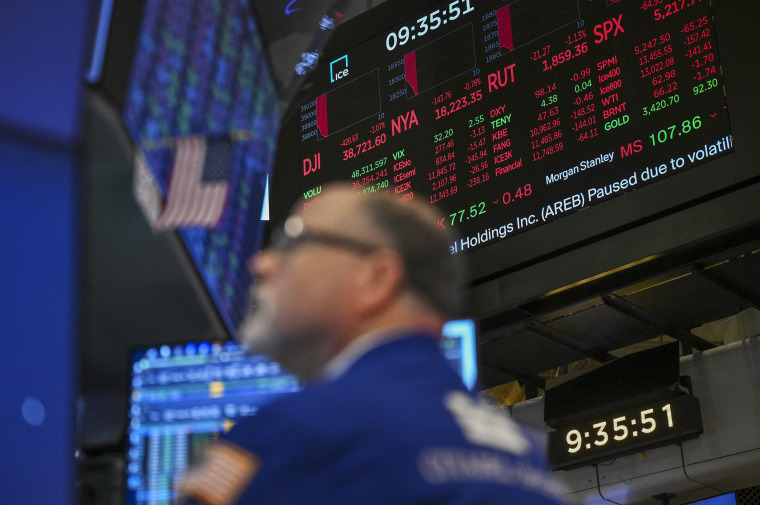HONG KONG — China on Thursday directly contradicted President Donald Trump’s claims that Beijing and Washington are actively discussing resolutions to a trade war that threatens to upend the global economy.
While Trump said Wednesday that the world’s two largest economies are “actively” talking, a Chinese foreign ministry spokesperson responded that “China and the U.S. have not engaged in any consultations or negotiations regarding tariffs, let alone reached an agreement.”
The spokesperson, Guo Jiakun, made the comments at a briefing in Beijing, saying that reports of ongoing talks were false. He added that while China is open to negotiations, “if it’s a fight, we will fight to the end.”
At 145%, Trump’s tariffs are higher on China than any other country. As he ratcheted up tariffs on Chinese goods in recent weeks, citing unfair trade practices, Beijing has responded in kind, bringing its total tariff on U.S. goods to 125% — levels that amount to a mutual trade embargo.
The prospect has raised fears of a global recession, sending markets whipsawing as trade tensions have done the same. Relations briefly appeared to improve Wednesday after the Trump administration signaled that it was discussing reducing tariffs with China.
Still, Trump and Treasury Secretary Scott Bessent gave conflicting accounts of the state of negotiations Wednesday, with Bessent saying “both sides are waiting to speak to the other,” without providing further detail. The secretary reiterated remarks he made the previous day, predicting near-term de-escalation.

“I don’t think either side believes that the current tariff levels are sustainable, so I would not be surprised if they went down in a mutual way,” he told reporters Wednesday in Washington.Trump, meanwhile, said that “everybody wants to be a part of what we’re doing” and that the U.S. and China had direct contact on trade “every day.”
A senior administration official told NBC News on Wednesday that the U.S. is speaking with China on tariffs but at a low level that has not involved Cabinet officials.
The mixed messaging came a day after Trump made comments that were interpreted as a potential softening toward Beijing.
Rather than playing hardball with China, the U.S. is “going to be very nice” and the final tariffs “will not be anywhere near” the current 145%, the president told reporters Tuesday.
White House press secretary Karoline Leavitt denied Trump was softening his tone, telling Fox News that “there will be no unilateral reduction in tariffs against China.”
Those comments poured cold water on U.S. stocks, which pared earlier gains Wednesday and slipped in premarket trading Thursday. Asian markets ended Thursday mixed, while European indexes fell in early trading.
The suggestion that tariffs could soon come down “reflects the pain that these tariffs have imposed and are likely to impose on U.S. businesses and U.S. customers, if continued,” said Lee Branstetter, a professor of economics and public policy at Carnegie Mellon University.
Talking about tariff reductions before winning any concessions from China or even starting serious talks looks like a climbdown, Branstetter said.
“That, to me, is consistent with the view that the president did not really think through the consequences of his tariff decisions,” he added. “They have now become much more evident to him.”
Growing impact
The impasse between the U.S. and China is causing growing anxiety as the implications become clearer. This week, the International Monetary Fund slashed growth forecasts for the U.S., China and most other countries, citing the effect of U.S. tariffs.
The White House is also increasingly concerned about possible shortages on U.S. retail shelves as orders begin for the holiday season at the end of the year.
A spokesperson for Hapag-Lloyd, a Germain container shipping group, said Thursday that its customers had canceled 30% of shipments to the United States from China over concerns about their trade dispute.
After a similar battle over tariffs in Trump's first term, China — which has long been preparing for a second trade war with the U.S. president — has not rushed to offer concessions or set up meetings with U.S. trade officials.

“We don’t care about what he wants,” said Wu Xinbo, a government adviser serving in China’s Foreign Ministry and a professor at Fudan University in Shanghai. The U.S. and China may exchange some information at the working level, but that’s not negotiation, he said.
“Trump just wants to send some reassuring signals to the domestic market, suggesting that ‘The Chinese are talking to us, don’t worry.’ But that’s not the case,” Wu said.
In the meantime, China faces its own pressures, including a slowdown in its export-driven economy that would only be made worse by tariffs. If domestic demand doesn’t pick up to compensate for the drop in exports, China may need to negotiate, said Gary Ng, senior economist for Natixis in Hong Kong.
It’s “quite hard” to convince the rising Chinese middle class to once again accept a decline in their living standards, Ng said.
Other factors, such as the fact that Chinese President Xi Jinping doesn’t have to answer to voters, may buy China some time.
“I think the Chinese have taken the measure of Donald Trump,” Branstetter said. “They’ve determined that he really can’t afford the economic and political cost that high tariffs, even on China alone, would generate, that he would fold pretty quickly if pushed. And that seems to be exactly what’s happening.”
